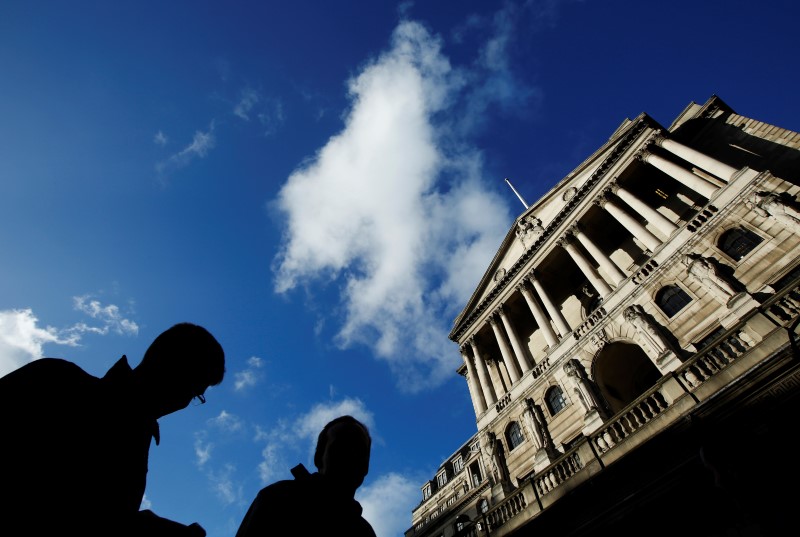Gold prices set for weekly gains on dovish Fed outlook; silver near record high
By Ana Nicolaci da Costa
LONDON (Reuters) - The Bank of England could be pulled in very different directions if British voters take the historic step of leaving the European Union in a referendum set for June 23.
Many economists believe a so-called Brexit would deliver a shock to Britain's economy that the central bank could attempt to soften by cutting interest rates from their current record low of 0.5 percent.
Yet at the same time, a vote to leave the EU could also provoke an inflationary fall in the value of sterling, potentially putting pressure on the BoE to raise borrowing costs.
The Bank may also have to take steps to steer Britain's huge financial services industry through any upheaval in markets.
Governor Mark Carney said last month the BoE was making contingency plans for the EU referendum, but gave no details. Below are possible implications of a Brexit for the bank.
MORE STIMULUS
Britain's economy has lost momentum of late and many economists believe a Brexit would slow or even shrink growth, especially in the short term, as the country tries to redefine its ties with the world's largest trading bloc.
Against that backdrop, the BoE could cut interest rates to revive the economy while expanding the bond-buying stimulus programme it used in response to the financial crisis and which it is maintaining at 375 billion pounds in size.
The BoE said recently it could buy corporate bonds if needed to help the economy, having previously focused almost all its quantitative easing programme on British government bonds.
Among the banks that have predicted what the BoE's response to a Brexit vote might be, analysts at Nomura said the central bank would probably cut interest rates by 50 basis points to zero if the economy showed it was turning down and might even take them into negative territory.
Financial markets are pricing in more chance of a BoE rate cut than a hike over the next year, based on SONIA (Sterling Over Night Index Average) interest rates, although money market analysts say some of the pull is being exerted by negative rates in other countries.
INTEREST RATE HIKE
An alternative scenario is that the shock of a Brexit vote is so severe that there is a run on the currency that pushes up import prices and inflation, raising pressure for a rate hike.
Analysts at Citi said sterling could fall 15-20 percent from its current levels, lifting consumer price inflation to 3 to 4 percent a year for several years. Annual inflation stood at 0.3 percent in February.
"Our base case is for no rate hike before mid-2017. But we see risks that sterling weakness in a Brexit scenario might trigger a surge in inflation expectations that pressures the MPC to hike rates significantly two-three years ahead (from now) to reaffirm their commitment to economic stability even amidst economic weakness and heightened uncertainty," Citi said.
A slim majority of foreign exchange strategists in a Reuters poll said a Brexit would lead to a situation so serious as to be seen as an outright sterling crisis.
"It would probably require the BoE to hike, despite weak demand, in order to support the pound, counter inflation and keep capital in the country," analysts at Berenberg said, adding that it nonetheless saw such a crisis scenario as unlikely.
Sterling has already fallen nearly 7 percent this year and over 2 percent against a trade-weighted basket of currencies since the referendum date was announced in late February.
Some of Britain's biggest firms are working a rate hike into their contingency planning. But when sterling lost about 25 percent of its value in just over a year at the start of the financial crisis, the Bank decided to proceed with rate cuts despite the inflationary impact of the weaker currency.
TWEAK THE CONTROLS
As well as interest rates, the BoE has other tools it uses to fine-tune Britain's economy, called macroprudential measures, which are designed to control the flow of specific types of credit offered by banks and other lenders.
The BoE has said it is close to raising the counter-cyclical buffer (CCB) for banks, an extra level of protection in the form of higher capital requirements against future loan losses, to reflect progress in Britain's recovery from the financial crisis towards more normal levels of borrowing.
The CCB currently sits at zero and could be raised if the BoE thinks banks need to be more insulated from a Brexit shock. Conversely, it could keep the CCB at zero to minimise any interruption in lending after a Brexit.
The BoE also requires banks to set aside cash to act as liquidity cushion in the event of extreme volatility in financial markets and it could toughen or relax those requirements to absorb short-term shocks.
Banks have been required to hold enough cash and government bonds to withstand outflows for up to a month without having to run down capital buffers or call on outside funds.
FIRE-FIGHTING
The BoE said in March it would offer extra funds to banks in the weeks around the June 23 referendum as part of its plans to keep financial markets running smoothly.
The Bank had been ready to hold extra indexed long-term repo operations (ILTRs) when Scotland voted in an independence referendum in 2014, but it did not make the plan public until after the vote was held.
The BoE introduced ILTRs in 2010 to avoid a repeat of the liquidity crunch seen during the 2007-08 financial crisis.
